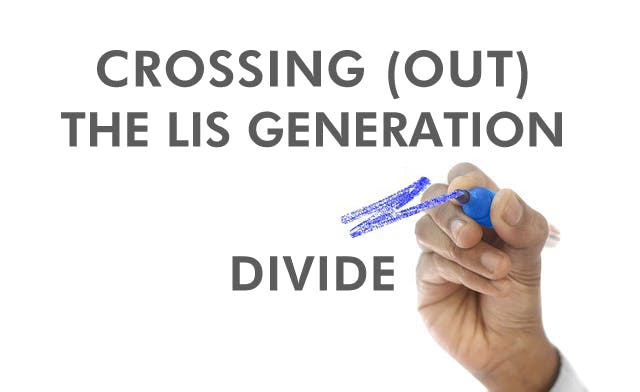 Roughly two decades ago, demographic trends indicated that ours was a profession substantially older than others, and that as all of those graying practitioners retired, we would face a daunting lack of library managers, leaders and staff.
Roughly two decades ago, demographic trends indicated that ours was a profession substantially older than others, and that as all of those graying practitioners retired, we would face a daunting lack of library managers, leaders and staff.
That was then.
Now we know that many of those potential retirees have chosen instead to “age in place,” as they say in the housing industry. They are staying in their jobs – and their management positions – much longer than anyone had anticipated, often due to finances, better health than expected, a desire to remain professionally and socially engaged, or simply an enjoyment of their jobs.
The benefit for the profession has been the retention of an incredibly broad and deep pool of experience and expertise. We have kept our institutional memory in place at a time when the credibility of information is more important than ever. We value our intellectual assets, and wisely so.
However, just as any personal strength taken to the extreme can become a weakness, are we now in jeopardy of having our profession’s growth and innovative thinking constrained by the expertise of those who began their careers in an era when libraries truly were about books and social media wasn’t even a twinkle in anyone’s eye? I would argue not necessarily so, but would also argue that the question of how to elicit the best attributes each of our four generations in the workplace can contribute will define our ability to create and grow into opportunities for impact in the coming years.
Ageism in the LIS profession: equal opportunity damage
 One of the interesting aspects of the “ageism in the LIS profession” is that individuals at both ends of the spectrum feel that they are targets of ageism (disrespect, disregard, dismissiveness). Young professionals, unaccustomed to the concept of “paying dues,” become discouraged when they’re belittled for their ideas and excluded from decision-making opportunities.
One of the interesting aspects of the “ageism in the LIS profession” is that individuals at both ends of the spectrum feel that they are targets of ageism (disrespect, disregard, dismissiveness). Young professionals, unaccustomed to the concept of “paying dues,” become discouraged when they’re belittled for their ideas and excluded from decision-making opportunities.
Older workers (and recent contributors to an LIS discussion thread on this topic pegged “older workers” as being anyone out of their thirties) feel hiring managers disregard their expertise for the “cool new ideas” of recent grads who often bring cutting-edge technology skills. This, of course, ignores the relationships, community knowledge, and collaborative outreach that only develops after years on the job.
Obviously, each of these scenarios is damaging to both our libraries and the librarians who work at them. There has to be a more effective and humane way to recruit, develop and manage four generations in the library workplace, but it will only happen if that becomes a priority, and if financial constraints don’t increasingly become the primary driver of hiring decisions.
As Brad Rogers, LibGig’s Director of Recruiting points out,
“We need to nurture skills, competency, and confidence across all age groups of LIS professionals. The turmoil and change we are currently experiencing may lead to a coming shortage of librarians with the skills and experience employers need. We simply can’t afford to lose outstanding people, no matter what age they are.”
How budget constraints help drive ageist outcomes
 By now the phrase “doing more with less” has become one of the defining clichés of today’s workplace. A rough translation is: we’ll lay off three people and then add all of their job responsibilities to your job description (with no change in title or pay). In the LIS profession, however, doing less with more has taken two other approaches:
By now the phrase “doing more with less” has become one of the defining clichés of today’s workplace. A rough translation is: we’ll lay off three people and then add all of their job responsibilities to your job description (with no change in title or pay). In the LIS profession, however, doing less with more has taken two other approaches:
- what’s described as “defining a job down,” which entails rewriting an existing professional-level job’s requirements to make it suitable for a lower-cost paraprofessional applicant, and
- splitting full-time positions into part-time ones that pay less, lack any benefits, and often offer no clear career path.
It’s important to note that not all libraries are taking this route to balance their budgets and that some are extraordinarily conscientious about treating their newest professionals with respect and support. But the main point is that often library directors will be faced with financial constraints that leave them with nothing but bad choices, and this may play out in decisions as painful for them as they are for their staff. It truly isn’t personal, but it is a business decision – and lest you forget, libraries are in their own way very much businesses.
Okay, but we still need to get way, way better at this
 The reality is that we have are likely to have a four- if not five-generation workplace permanently comprising demographic cohorts who have radically different life/professional expectations and worldviews. Those differences play out in myriad ways that can infuse our workplaces and thinking with a rich diversity of viewpoints, innovative ideas, and learned experience.
The reality is that we have are likely to have a four- if not five-generation workplace permanently comprising demographic cohorts who have radically different life/professional expectations and worldviews. Those differences play out in myriad ways that can infuse our workplaces and thinking with a rich diversity of viewpoints, innovative ideas, and learned experience.
Or, those differences can play out as entrenched power positions, enforced through dismissive comments, exclusion from key organizational roles, opportunities and initiatives, and an ongoing effort to make sure our newest professionals pay their dues (often for years) before they’re taken seriously. Needless to say, this latter approach deprives those eager new hires of an ability to learn important insights from senior staffers by working closely with them, and is almost guaranteed to drive our best and brightest from the profession.
What are some of the questions we need to start asking when it comes to diffusing ageism in the profession? Here’s a starter list:
- How do we get better at age-neutral hiring?
- How do we get better at creating cross-generational collaborative teams?
- How do we set up mentoring programs, based on needed skills transfer rather than seniority?
- How do we create opportunities for meaningful contributions from each generation of staffers?
- How do we create an innovation-friendly, fail-fast-learn-faster environment?
- How do we respect and support our older professionals without letting their traditional expertise turn into obstacles to innovation?
- How do we support and respect each generation’s communications styles, understanding that this involves understanding and compromise among all communicators?
- How do we respect and elicit each generation’s strengths, while treating their “perceived” weaknesses with compassion, patience, humor, and support?
- How do we grow together as a profession, so that those who wish to remain in positions of leadership (or even in staff positions) as they get older not only understand the importance of constantly updating their skills but also embrace this as a core professional responsibility?
In terms of concrete actions, if you’re an employer making hiring decisions, your way of moving us forward will be to look beyond age-based stereotypes and see instead the individual skills, expertise, passions, and potential of that applicant, regardless of his or her age.
And if you’re an older employee? Your commitment to keeping your tech skills current, your attitude positive, and your outlook flexible and adaptable will go a long way toward helping diffuse demeaning assumptions about older professionals.
In the end, we are all self-employed and no one is entitled to their job, no matter how long (or short) they’ve been in that position. But these questions can and should be addressed throughout the profession, including in MLIS management courses, association professional development efforts, and via in-the-trenches management discussions. For the rest of us? Perhaps we can all take responsibility not only for our own possibly ageist assumptions, but also for a commitment to aging in place by growing ever-more competent, fearless, and inclusive.
